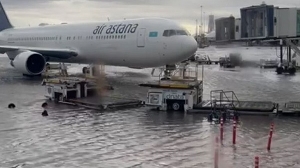- Home - News
- TWI News | TV
- Polls
- Year In Review
- News Archive
- Crime & Punishment
- Politics
- Regional
- Editorial
- Health
- Ghanaians Abroad
- Tabloid
- Africa
- Religion
- Election 2020
- Coronavirus
- News Videos | TV
- Photo Archives
- News Headlines
- Press Release
General News of Tuesday, 31 January 2012
Source: GNA
Criticism of China's attempt to recolonise Africa dispelled
From Benjamin Mensah, GNA Correspondent in Addis Ababa, Ethiopia
Addis Ababa, Ethiopia, Jan. 31, GNA - Alhaji Mohamed Mumuni, Minister for Foreign Affairs and Regional Integration, on Tuesday discounted criticisms that China was endeavouring to re-colonise Africa with its increased interest in the economies African countries.
He explained that China’s interest in Africa was a demonstration of strategic partnership, and a symbol of South-South co-operation.
Alhaji Mumuni was speaking to journalists in Addis Ababa, after the 18th Ordinary Session of the Assembly of Heads of State and Government of the African Union (AU) in Addis Ababa, Ethiopia.
The summit was attended by Mr Jia Qinglin, Chairman of the National Committee of the People’s Political Consultative Conference.
The $200 million new complex conference hall that was a gift by China to the AU was inaugurated.
China also promised to provide free RMB 600 million assistance to the Union in the next three years, and add new dimensions to the China –Africa relations.
China said it would work with the AU to improve the China-AU Strategic Dialogue, and enhance co-operation in cross border and cross region infrastructure development in Africa.
Alhaji Mumuni said he shared the opinion of Chinese President Hu Jintao that the international community must view the development of Africa from the perspective of common destinies.
He said there were the failures of Africa’s traditional development partners in the face of the current global economic crisis, and advocated the need for Africa to look elsewhere for support, and increase trade among countries of the Continent.
Alhaji Mumuni called on African countries to remove tariff and non-tariff barriers and many roadblocks that increased the cost of transacting trade, and take strategic measures to enhance infrastructure - better transport, seaports and airports.
The Minister said the AU session agreed that the next AU summit would be hosted at Lilongwe, the Malawian capital in either June or July this year.
The summit resolved to pursue banking reforms, a Free Trade Area for the entire continent in the next five years, and to moderinise rail, air and road transport to boost trade.
The AU agreed to seek international financial support to implement US$78 billion infrastructure projects, to connect African countries to facilitate trade and other economic activities.
“There should be an overall resource mobilization domestically to develop infrastructure and work towards innovative sources of financing," AU Chairman President Yahya Boni of Benin said.
The Heads of State and Governments said although most countries were able to record more than 6 per cent Gross Domestic Product, the rate was too low to have sustained effects on poverty.
Ethiopian Prime Minister, Meles Zenawi, currently the Chairman of the New Partnership for Africa’s Development, was mandated to lead a seven-member Heads of State Committee, called the “High Level African Trade Committee'', to consider ways of raising funds.
The leaders agreed to seek new sources of funding through taxation of aid money in the continent, taxes from minerals and mining deals, and revenue from dealings of banks within Africa as well as multilateral bodies, to fund the trade boost.
“We are determining to address the issue of stability and lead to the prosperity of our continent. We have to ensure growth rate is higher above the population growth in Africa,” President Boni said.
The leaders pledged to work hard to towards the acceleration and deepening of markets in Africa.
They also called for efforts to promote the industrialization of Africa, through streamlining raw material exports, improving the manufacturing capability in of countries and diversifying the economies of African countries to prevent them relying on export commodities.
The leaders agreed that the seven-member Heads of State panel would present a workable plan to boost intra-African trade.
They also agreed on the consolidation of ongoing efforts to integrate economies in Eastern and Southern Africa and a plan to push those efforts through to 2017.
The AU, the Economic Commission for Africa and the African Development Bank, were mandated to carry out studies to inform debate on the implementation of the road map for a Free Trade Area.
Concerning a road map to a continental Free Trade Area, the leaders said the finalization of the East African Community, the Common Market for Eastern and Southern Africa and the Southern Africa Development Community were efforts to unite their economies within two years.
The leaders decreed that other regional blocs should proceed to finalise the Free Trade Areas on a parallel basis within two years and consolidate the continental Free Trade Area.
Ghana’s President John Evans Atta Mills delivered the keynote address at the Summit, in which he called on colleague leaders to consider youth employment as pertinent to boosting intra-African trade.
He unveiled a statue of Dr Nkrumah, Ghana’s first President, erected by the AU in honour of the role Dr Nkrumah played in the African liberation struggle, and the founding of the AU precursor, the Organisation of African Unity.










